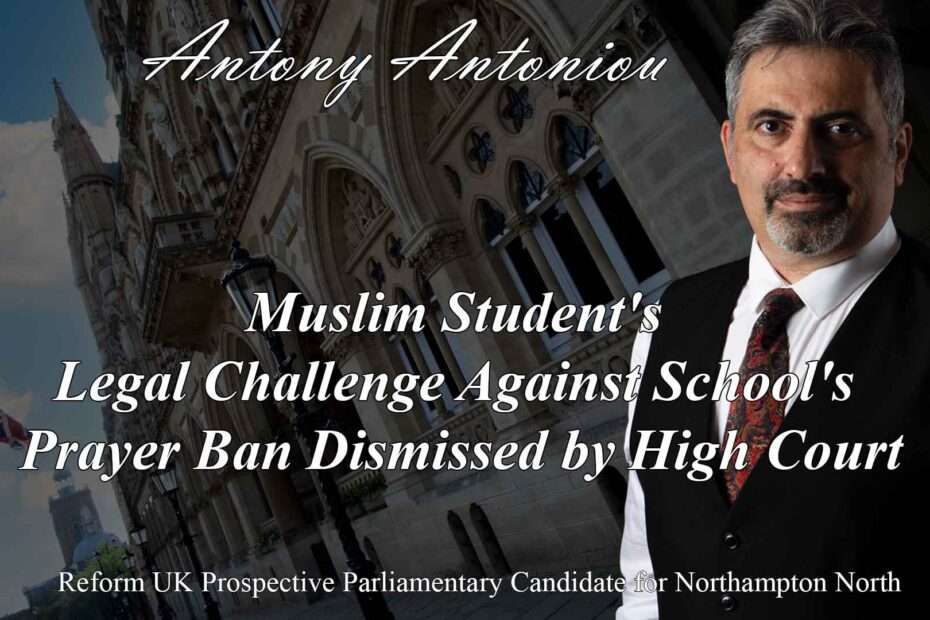Muslim Student’s Legal Challenge Against School’s Prayer Ban Dismissed by High Court
A Muslim student’s legal battle against a London secondary school’s ban on prayer rituals on campus has come to an unsuccessful conclusion at the High Court. The court ruled in favor of Michaela School, a non-faith state secondary institution located in Wembley, upholding the school’s policy that prohibits students from engaging in prayer rituals during school hours.
The student, who cannot be named for legal reasons, argued that the school’s ban on prayer rituals was discriminatory and infringed upon her right to freely practice her religion. However, in an 83-page written judgment, Mr. Justice Linden dismissed the student’s case, stating that “the claimant at the very least impliedly accepted, when she enrolled at the school, that she would be subject to restrictions on her ability to manifest her religion.”
Katharine Birbalsingh, the founder and headteacher of Michaela School, celebrated the ruling as a “victory for all schools.” In a statement released on social media, Birbalsingh asserted that schools “should be free to do what is right for the pupils it serves” and should not be forced to change their approach simply because one student and their parent disapprove of a particular policy.
The case centered around an incident in March 2023 when up to 30 Muslim students at Michaela School began praying communally in the school yard, using their blazers as makeshift prayer mats. This prompted the school to introduce the contested ban on prayer rituals due to concerns about a “culture shift” towards “segregation between religious groups and intimidation within the group of Muslim pupils,” according to the court’s evidence.
Michaela School, which boasts an “outstanding” rating from Ofsted, the Office for Standards in Education, Children’s Services and Skills, is known for its strict rules and expectations for students. These include remaining silent in corridors, focusing extensively on teachers during lessons, and adhering to uniform policies. The school’s rules also prohibit students from gathering in groups larger than four, including in the school yard.
While there is no legal requirement for schools in England to provide designated spaces or times for students to pray, some schools do choose to make such accommodations for their Muslim students. However, the High Court’s ruling affirms the right of individual schools, headteachers, and governing bodies to make decisions about whether or not to allow prayer rituals on their premises, based on their assessment of what is best for their student body.
During the legal proceedings, the student’s legal team argued that the ban on prayer rituals had a disproportionate impact on Muslim students due to the specific times and rituals required for Islamic prayers. They contended that the student was making a “modest” request to be allowed to pray for approximately five minutes during her lunchtime on dates when her faith required it, but not during lessons.
However, Mr. Justice Linden rejected this argument, stating that Islam allows for “Qada prayers” or “make-up” prayers for those that have been missed, and that the student herself acknowledged that she and her friends believed prayer was not permitted at school even before the policy was introduced, and therefore made up for missed prayers when they returned home.
While the student expressed disappointment with the ruling, she affirmed her belief that she “did the right thing in seeking to challenge the ban” and that she was “true to myself and my religion.” She plans to remain at Michaela School and focus on her upcoming GCSE exams, expressing gratitude for the understanding shown by her non-Muslim friends at the school.
The student’s mother also voiced her support for her daughter’s “impassioned stance,” stating that while she was “dismayed” by the High Court’s ruling, she stood firm in her decision to back her daughter’s legal challenge, and believed that her daughter had gained “invaluable lessons from the experience.”
The case has reignited broader discussions about the role of faith in England’s education system, with secular organizations such as the National Secular Society and Humanists UK renewing calls for reforms to separate religion from schools entirely. On the other hand, the ruling has been welcomed by those who argue that schools should have the autonomy to set their own policies and create an environment that fosters inclusion and prevents potential divisions along religious lines.
As the debate continues, the High Court’s judgment serves as a reminder of the complex balancing act required when navigating issues of religious freedom, educational autonomy, and the rights and well-being of all students within the diverse landscape of England’s school system.

